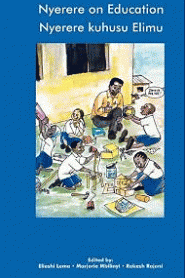Julius Nyerere, the former and founding President of the United Republic of Tanzania, is known not only as one of the world's most respected statesmen and an articulate spokesman of African
liberation and African dignity but also as an educator and an original and creative educational thinker. Before launching his political career, he was a teacher, and as a result of his writings on
educational philosophy and the intimate interaction between his political leadership and educational leadership for the country, he is fondly and respectfully referred to by the title of "Mwalimu"
(teacher) by Tanzanians and others.
This is Gillette's view of him: Indeed, part of Nyerere's charisma lies in the fact that, before launching his political career with the founding of the Tanganyika African National Union (TANU) in 1954, he was a teacher and that his concept of his role as national leader includes constant reassessment, learning and explanation, i.e. education in the broadest sense. Since Independence, and particularly since the threshold year of 1967, Tanzania has been something of a giant in-service seminar, with Nyerere in the professor's chair (Gillette, 1977).
Many features of his educational philosophy have a universal relevance and have inspired many educators and educational and development organizations around the world. In particular, his
educational philosophy has often been regarded as an appropriate and rational educational alternative for many Third World countries. It has to be understood in the light of the realities of
underdevelopment, perpetuated by colonialism and nascent capitalism in many Third World countries, including the United Republic of Tanzania. More specifically, it has to be understood in
relation to changing the inherited Western model of education in a poor and developing country aspiring to a self-reliant and socialist development, for, in the final analysis, it is the goals of
egalitarianism and human-centred development that characterize Nyerere's political ideology.
Nyerere's philosophy of adult education and adult learning is considered very progressive amongst the international adult education community and non-governmental organizations engaged in development work. His philosophy of adult education resonates with the concepts of "conscientization", empowerment and liberation very akin to the ideas expressed in Paulo Freire's Pedagogy of the Oppressed, while his ideas on adult learning are very similar to the theories and principles of adult learning of such renowned adult educators as Malcolm Knowles of United States and J. Roby Kidd of Canada. It was because of his vision of, and commitment to, adult education that he was approached to become the Founding Honorary President of the International Council for Adult Education in 1973.
The bulk of this article is devoted to an examination of Nyerere's educational philosophy; it is followed by a short section on the major changes and reforms that have taken place in the Tanzanian education system.
More on Attachment..

